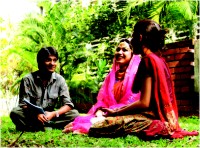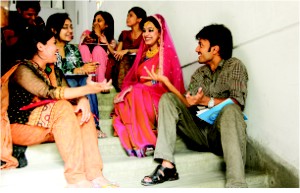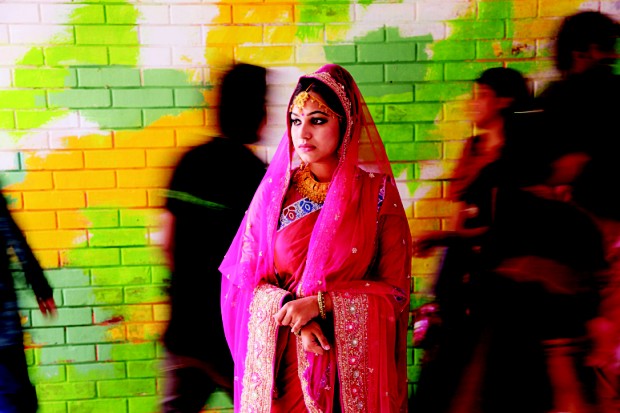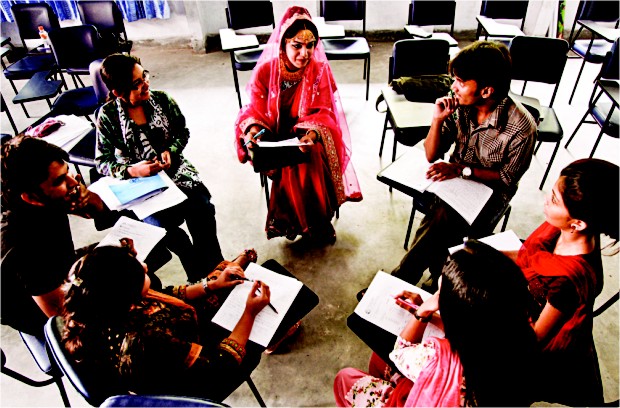| Home - Back Issues - The Team - Contact Us |
 Linking Young Minds Together |
| Volume 3 | Issue 26 | July 03, 2011 | |
|
Spotlight
Grooms over Grades Sabhanaz Rashid Diya Photos: Sabhanaz Rashid Diya "APA, apni ki bibahito?”(Excuse me, are you married?) Anushah nearly jumped off of her seat. A man, probably in his mid-forties and cramped between two seats, stared back at her. Suspecting a stalker, she frowned and posed angrily. “Amar shathe kotha bolchen?”(Are you talking to me?), she asked. The public bus skidded past New Market. “Jee apa, apni ee. Maareed?” (Yes, you. Are you married?) Sensing the discomfort between them, he added, “Apa, pleej beparta onno bhabe niyen na. Ami ekjon ghotok, Moimonshingho theke ashchi. Apni bibahito na hole apnar shathe ektu kotha boltam. Chhele khub ee bhalo.” (Please don't take it otherwise. I am a match-maker from Mymensingh. If you aren't married, I would like to talk to you about a potential match. The groom to be is quite a catch!)
22-year old Anushah was taken aback. In the absence of a henna-soaked beard and paan-dyed teeth, the man looked nothing like a ghotok (marital matchmaker). Clean-shaved, dressed in a formal shirt and trousers with a shoulder bag clasped under his right arm, he could be anyone from an MBA student to a government official. On top of that, he had the uncanny honesty to discuss marriage proposals on a public bus. For Anushah, this was awkward and unexpected. Surprisingly enough, such encounters are not uncommon for many young women attending public and private universities across the country. Although, as a democracy, we may have come a long way from child or underage marriage, the tendency of getting daughters married off by the time they reach third year at university is still in practice. Dr Roushan Ara, retired physician under the Ministry of Health got married when she was in her second year at medical college in 1972.
“I'm not against marriage while attending university,”she recounted. “I got married since I was in love, as well as because I knew my husband and his family were willing to support my education. I think it is a matter of personal and mutual understanding. Girls need to consider whether their environment is supportive of their ambitions before deciding to get married.” Selina, a third-year student from University of Dhaka, however shared a very different perspective on the matter. Her best friend, Helna tied the knot a year back and Selina draws her stance from the difficulties her friend had faced.
“Her parents were worried that she will have an affair with a shontrashi (politically motivated goon) and decided to get her married off. The groom was a green card holder from the US and she didn't even get a chance to know him. It all happened very fast!” Although the groom's family reassured her parents that they would allow Helana to continue with her education; in the end, it never worked out. Within a few months, Helana was asked to leave university and travel to the States to live with her husband. “Now, she is just a high-school graduate and a housewife,” Selina remarked with contempt. “It was unfair of her parents to make such a decision for her!” As a society, we have a predisposition to blame our parents for everything that has gone wrong in our lives. The compromised upbringing, the life choices, the groom- many from the list are perhaps bad decisions made by people with very good intentions. Question arises, are so called early marriages consequences of a collective insecurity? “What if she fell in love with the wrong guy?” asked Shamima Abedin, banker and mother of two daughters, one of whom married recently during her third year at university. “I don't trust boys today, mishti kotha bole matha noshto kore dibe (they convince girls with sugar-coated words). I did what I needed to do, to protect my daughter and make sure that her future is comfortably settled with a man who values her and fits in with the family.” “It's not everyday that a decent boy sends a marriage proposal,” elaborated Mrs Jannat Ara Monowar. Now in her mid-fifties, she has raised three children, two boys and a girl -- all married. Her daughter, Raisa is currently a final year medical student and mother of a toddler. “My husband died a long while back and I had to keep the family together. It is fortunate that Raisa's husband is very accommodating; her in-laws are extremely supportive and takes care of her son while she is studying.” Dr Farzana Islam has worked extensively on child and adolescent development at the Child Development Centre under Dhaka Shishu Hospital. As a professional, she feels both young girls and parents need to come to terms with their realities before taking the next big step in life. “Girls who are studying at university are accustomed to an environment where adda (hangout), friends, assignments and grades become an integral part of life. A sudden change in environment can disrupt that natural process greatly. One day, she is in class and the next day, she is helping her mother-in-law to cook. What needs to be understood is whether she, as an individual is ready to take up such responsibilities. Chances are, she isn't and in many cases, will lead to her withdrawal from social gatherings and common places where people her age would hang out and socialise. Just because they are doing their 'higher studies' does not necessarily mean that they are mature enough to handle a husband, another family and a whole different world.”
Rezwan and Sarah got married during second year at university. They were dating and felt they needed to settle the matter in a more legal and social manner before word spread in the wrong direction. Both families agreed and their akhdt (marriage) was held between close relatives. However, because they felt moving to a new home may disrupt their education, Sarah lived with her parents. As their graduation is nearing, they decided to have a big ceremony in a few months and Sarah will move in with her in-laws.
“This was possible because our relationship was based on mutual respect and our families valued our independent decisions,” said Sarah. “We both felt it was best we continue with our own lives and prioritise our studies and career, while maintaining a more socially and religiously acceptable relationship. Now, we're both ready to live together and build a family together.” 22-year old Suhana, however had her big wedding day within months of getting admitted to a private university in Dhaka. She has a one-year-old daughter and commutes between her classes, in-laws' place and her parents' place on a regular basis. “My father and father-in-law were friends and decided to take their friendship to the next level. My husband, then a fresh graduate from BUET agreed and it just happened. It has been difficult to maintain so many relationships, keeping up with so many commitments over the years. Sometimes, I miss classes because my daughter has a cold or I am needed elsewhere. The juggling of jobs can be overwhelming,” “Our cultural norms imbed a sense of submission in women,” explained Dr Islam. “The girl will probably not protest, but as responsible parents, we need to comprehend her perspectives and prioritise her needs. Marriage is a mutual understanding and sharing of responsibilities between a man and a woman, and they both should to be aware of themselves, their limitations and their goals in life before agreeing to it.”
A closely-knit society, Bangladesh and perhaps, some places in South East Asia often feel threatened by social retributions. The many what-ifs take a larger form and end up playing a key role in the choices we make for ourselves and the people around us. Early marriage, colloquially 'campus biye' or marriage during university years are common, yet not necessarily bottoms down to the best consequences. Our progress as a community depends on many things, two of which are independence and mutual respect. We need to allow young women to make their own choices, instead of inflicting our supposedly rational insecurities upon them, and help them make more logical and suitable decisions. Now is always a good time to reflect and revise, and make choices based on our needs, goals and limitations.
Copyright (R) thedailystar.net 2011 |
||||||||








